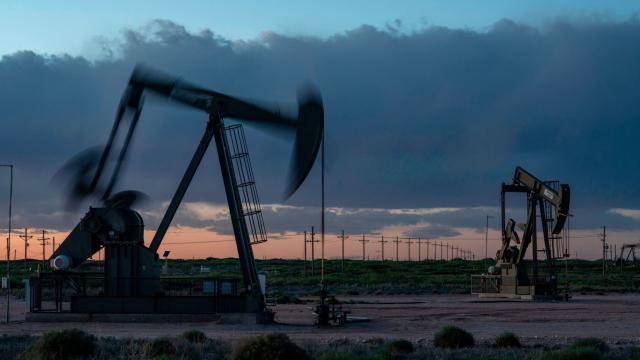Banks are finally starting to get it: Fossil fuels ain’t worth it. Just last week, Citigroup joined the wave of banks no longer investing in oil and gas projects in the Arctic. The only major bank in the U.S. that hasn’t committed to this is Bank of America. The economic crisis brought on by the spread of drop into negative territory earlier this month. The price of tar sands has been so low that a pack of toilet paper may cost more. There’s so much oil sitting around that producers don’t know what to do with it while some have resorted to storing it at sea. Seriously.
In short, it’s bad. And banks are losing a lot of money as a result. After all, the money fossil fuel companies spend to build their precious pipelines and projects depends on loans. Combined, JPMorgan Chase, Wells Fargo, Citi, and Bank of America alone had $US60 ($92) billion in outstanding loans to energy companies at the end of last year’s fourth quarter, according to MarketWatch. The pandemic is exposing the risk these loans carry.
As permanent as the changes we’re experiencing feel, all this is pretty short term in the big picture of economics. And long-term trends are what banks care about, Vizcarra said. For oil and gas, the long term doesn’t look too great. Because, hello, climate change means no more fossil fuels. That future, however, feels a lot more tangible now that banks have actually seen what the death of oil might look like, particularly if they don’t start planning for it now.
“Making that risk a reality and seeing that upfront”what that could really do, that demand shock, which causes a severe price drop”I think that will probably adjust some of their longer-term concerns,” Vizcarra said.
The focus of banks”and the activists putting pressure”so far has been on expensive fossil fuel projects and why they’re a lousy return on investment. That’s why a growing number of banks are eschewing funding for projects in the Arctic and putting an end to coal finance. These make the most economic sense right now. Drilling in the Arctic comes with tremendous environmental risk, and coal is all but dead.
The pandemic could speed up that calculus for oil and gas as well. Activists won’t stop pressuring financial institutions to take action, especially now that they’ve seen pressure works. And banks are getting a look at unmanaged decline, haywire markets, and the risks both pose to their bottom line.
“I think it probably will have an impact because they will look and see a much more volatile exposure than they would’ve been expecting three to five months ago,” Nick Villiers, the director of the Centre for Sustainable Finance at the University of Cambridge Institute for Sustainability Leadership, told Earther. “They will demonstrate in a very real way the risks to banks they are carrying with exposures to some of these assets and, therefore, making these commitments [to stop financing fossil fuels] will seem more attractive and have less of a downside.”
In the ideal world, leaders would learn from this moment and begin to increase the capacity of carbon-free energy. In that world, Villiers can see banks stopping funding the extractive fossil fuel industry entirely.
These changes in the economic sector won’t happen overnight. But the coronavirus has made one of the banks’ most-feared scenarios real. Not all will walk away from this wiser, but they can’t say they haven’t been warned about what’s to come.
